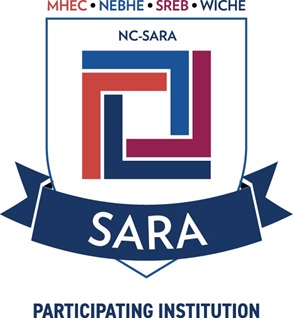Licensure
Authorization for Distance Learning

Carolina University has been approved to participate in the National Council for State Authorization Reciprocity Agreement (NC-SARA) which allows us to provide distance learning programs (both online and in the form of supervised field experiences) and coursework to residents of states other than North Carolina. Click here to visit CU's State Authorization for Distance Education page.
Professional Licensure
If you are a student or prospective student interested in an educational program that may lead to professional licensure or a certification, please be aware that as of July 1, 2020, the U.S. Department of Education requires that all higher education institutions advise students as to whether their curriculum meets state education requirements for license and/or certification in the state for which they plan to practice.
If you are planning to seek a professional license or certification outside North Carolina, it is important for you to know the specific requirements of the state in which you intend to apply for licensure or certification.
Disclosure Statement
Enrollment in a program does not guarantee a degree from Carolina University or qualification for professional licensure. Students are responsible for meeting all academic and professional requirements for graduation.
Prospective students should be aware that each state has different professional licensure and certification requirements governing various occupations. Carolina University works to confirm if its educational programs meet the educational prerequisites for professional licensure or certification outside North Carolina and update this information each year. Students who plan to pursue licensure outside North Carolina should be aware that state licensure requirements are subject to changes. CU subject matter experts will work with students to verify their individual eligibility for state licensure and satisfaction of any requirements imposed thereby. While a program may originally meet the educational requirements for licensure, changes in requirements could impact the program’s ability to meet any new educational requirements. Students are welcome to check with their state licensure board to confirm licensure requirements and obtain additional guidance as needed from the respective licensure board.
Important Note for Students: The curriculum for all CU academic programs has been designed to meet the licensure/certification requirements in North Carolina and prepare students to sit for licensure/certification exams in North Carolina. The various licensure boards in each state are responsible for setting requirements for licensure/certification in their state. If you are a student studying at a distance with the intent of returning or moving to any state other than North Carolina, please use the links below to explore the unique licensing board requirements for that state.
To learn about the appropriate licensing or certification organizations and their requirements, contact information for professional licensing boards or certification organizations is found below.
Professional Licensure Disclosure (All DL Programs)
Carolina University participates in the National Council for State Authorization Reciprocity Agreement (NC-SARA). Participation in NC-SARA allows the University to provide distance learning programs and coursework to residents of states and territories outside North Carolina. However, NC-SARA does not grant automatic reciprocity with other states or exempt Carolina University from the professional licensing requirements required by other states or territories.
Carolina University’s programs and courses meet the licensure requirements for professional organizations in North Carolina. The University is in the process of determining the licensure requirements for its professional licensure programs but has not yet determined whether its online degree programs meet the requirements for professional licensure in every U.S. state and territory.
Current Students: Your advisor will contact you to determine the professional licensure requirements for the state in which you are located or hope to work.
Prospective Students: An enrollment advisor will provide the professional licensure requirements prior to your enrollment.
Learn more about professional licensure at https://www.nc-sara.org/resources/professional-licensure.
The mailing address for all program directors at Carolina University is:
420 S. Broad Street
Winston Salem, NC 27101
Phone: (800) 937-5097
Criminal Justice
Carolina University Contact: Dr. Heather Burkard
Email: burkardh@carolinau.edu
https://www.iadlest.org/post-portal
Deaf Studies
Carolina University Contact: Dr. Kent Oviatt
Phone: (336) 297-7937
Email: oviattk@carolinau.edu
https://rid.org/programs/gap/state-by-state-regulations/
https://rid.org/certification/available-certifications/
https://eipa.boystown.org/
Counseling
This program does not lead to licensure and is not intended or promoted to fulfill the licensure or certification requirements in any state.
Carolina University Contact: Dr. Ronald Dasher
Phone: (336) 714-7876
Email: dasherr@carolinau.edu
State Agency Contact Information: https://nbcc.org/directory
Computer Science
Carolina University Contact: Dr. Wiseborn Danquah
Email: danquahm@carolinau.edu
https://csab.org
CU's Computer Science degree prepares students with a foundation that, through additional study and specific exam review, will prepare students to seek specific certifications (e.g. CCDE, CCNA, etc.). Upon successful completion of your degree, there may be fees associated with professional exams as well as work experience required for employment. Computer Science certifications are regularly evolving, so students should regularly communicate with CU subject matter experts to verify certification requirements.
Data Science
Carolina University Contact: Dr. Murchtricia Jones
Phone: (336) 714-7874
Email: jonesm_2@carolinau.edu
https://www.dasca.org/get-started/how-to-become-dasca-certified
info@dasca.org
CU's Data Science degree prepares students with a foundation that, through additional study and specific exam review, will prepare students to seek specific certifications (e.g. ABDE, ABDA, SDS, etc.). Upon successful completion of your degree, there may be fees associated with professional exams as well as work experience required for employment. Technology certifications are regularly evolving, so students should regularly communicate with CU subject matter experts to verify certification requirements.
Education
Carolina University Contact: Dr. Kristina Railsback
Phone: (336) 297-7949
Email: railsbackk@carolinau.edu
https://www.ed.gov/contact-us/state-contacts
Engineering
Carolina University Contact: Dr. Rasitha Fernando
Phone: (336) 714-7939
Email: fernandor@carolinau.edu
https://ncees.org/about/member-licensing-board-directory/
https://ncees.org/contact/
Psychology
This program does not lead to licensure and is not intended or promoted to fulfill the licensure or certification requirements in any state.
Carolina University Contact: Dr. Rosalie Kern
Phone: (336) 714-7956
Email: kernr@carolinau.edu
State Agency Contact Information: https://www.
Public Health
Carolina University Contact: Dr. Tehmina Khan
Email: khant@carolinau.edu
https://www.nbphe.org/
info@nbphe.org